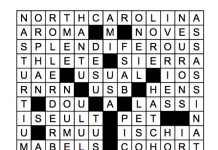The Waterloo city council took a big step towards affordable housing as they approved upgrades to increase an affordable housing project from six stories of 700 units to twelve stories of over 900 units.
The council’s affordable housing project covers a 25-acre plot of land that the city owns at 2025 University Avenue East. “We initially thought… we could put about 700 housing units – affordable and attainable,” said Mayor Dorothy McCabe. “But then we did some consultation and people in the community said ‘go bigger’… ‘go up to 12.’”
The affordable housing project is now planned to be a maximum of twelve storeys, at least 900 units of two to four bedrooms each, and a variety of amenities and types of units. The rent will be classified as affordable housing so it must be the smaller amount of either 30 per cent of what 60 per cent of the Waterloo population earns, or 80 per cent of the average rent.
Additionally, there could be multiple non-profits that will want part of the units to be held for Indigenous people and some to be under the deeply affordable category. “We are going out to the non-profit community and asking them to come to us with their ideas,” McCabe said. “So it could be sliced and diced a few different ways.”
There are solid milestones that McCabe is aiming for to get construction for this project started. A Ministerial Zoning Order (MZO) is needed to convert this property, “which we are confident that the province will do,” McCabe said. “We’re hoping with all that work that has to happen that we could have shovels in the ground by this time of the year 2025.”
University students are eagerly awaiting this project as they have had their fair share of difficulties in the Waterloo housing market. “I currently pay $786 and I can barely keep up with it,” said Mariam Al-Hulaibi, a UW science and business student who has been living in Waterloo for almost three years. “My rent has been increasing 2.5 per cent every year and I have to start paying about $805 this coming fall, which is completely unrealistic given how many hours I get at my part-time job while also trying to do well in school.”
Some students believe that more is needed to properly improve the housing market in Waterloo. “I don’t think 900 units is enough,” said Ash Esmander, a UW physics and astronomy student. “It’s unfair. Students are known to struggle financially due to tuition, living away from home, and some of us can’t work part time jobs and study at the same time, but in my opinion the market is just going to get worse and prices are going to keep on increasing.”
That need is heard in the city council as well. “With the growth and everything that’s happened here, we probably need somewhere in the neighbourhood of 2,500 to 3,000 more affordable housing units,” McCabe said. McCabe is hoping that this project will “be a huge chunk of that.”
Students are also hoping there will be a variety of environmental strategies employed in the project. “I would make sure the building has recycling and composting options, as I know lots of buildings I’ve lived in didn’t offer either,” said William Hardie, a UW social development studies student. Al-Hulabi also echoed that statement as she stated, “Waterloo has so much potential for renewable energy with our mega-high winds and heavy rainfall that I am disappointed more buildings haven’t integrated this yet.”
McCabe agrees and is looking to implement sustainable ways to make this project environmentally friendly. “That’s one thing we’ll look to have… really high rates of energy efficiency for any of the appliances,” McCabe said. “We’re looking to capture rainwater for the laundry or toilet system.”
Some may wonder where Waterloo is getting the money to pay for this affordable housing. McCabe assures the public they have the funds for this project and future affordable housing. “In early 2024, we received $22 million from the federal government through the Housing Accelerator Fund. So we’re going to be using that money to support this project,” said McCabe. “Kitchener, the City of Cambridge, and the Township of Woolwich also got money from the federal government. So we’re each looking to use that money to build more affordable and attainable houses.”
This affordable housing project is important, and a step in the right direction as so many people have felt the harsh effects of the housing crisis. “Cheaper renting options for students would change lives,” Hardie said. McCabe agrees that she suspects “this will be one of the biggest decisions that we will make as a council in this term of office.”
Go to www.engagewr.ca/waterloo to provide feedback and learn more about this affordable housing project.































